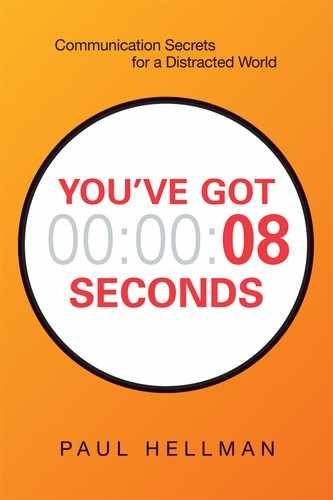SHOULD YOU READ THIS BOOK? WHAT IF YOU DON’T HAVE TIME?
“I tend to make up my mind about people within thirty seconds of meeting them.”
—RICHARD BRANSON, founder of Virgin Group
Warning: Others Are Making Split-Second Decisions about You—Right Now
They’re deciding whether or not to listen to you, or read your emails, or, in general, give you the time of day.
“Are you the speaker?” people sometimes ask me before a meeting.
“Yes,” I say. “Or at least I’m going to pretend to be.”
But the truth is, every person in that room is on stage, because you and I present ourselves every day. And even if you’re working at home, the moment you get on the phone and say “hello,” people will infer all sorts of things about you—your intelligence, your attitude—just by your voice.
Same thing with your emails.
The point is, small moments aren’t so small.
Back to our meeting. Suppose it begins with self-introductions. A small moment? Maybe not.
When it’s your turn, you say:
1.“I’m Harriet.” But you speak softly, as if you were wanted by the FBI and you suspect that half the room is working undercover.
Your volume speaks volumes. Speak up, send the message that your message is IMPORTANT.
2.“I’m Harriet.” But while speaking, you fidget with your hair, or your jewelry, or you touch your face—these are known as grooming gestures. Not recommended, although preferable to fidgeting with other people’s hair or faces.
3.“I’m Harriet???” You make routine assertions sound like questions by ending every sentence on a higher note. As if you believe that, in this universe, nothing is certain and you just discovered, much to your surprise, that you are, in fact, Harriett. Or at least you could be Harriet. The whole thing is bewildering . . .
The premise of this book is that people’s attention spans are ridiculously short, that sometimes all you get is a moment, and that these moments count.
Let’s seize them.
No Time?
Let’s talk about your time. In the next 24 hours, everyone in your organization—in every organization—will do one of three things:
1.Talk
2.Listen
3.Pretend to listen
You definitely don’t have time. No one does, it’s the information age, which means you’re flooded with meetings, emails, and breaking news, every second of every day.
But consider: your colleagues and clients don’t have time either. For sheer survival, they’ll screen out anything that sounds like noise.
Let’s make sure that you get heard.
Back to the book: As you’ll see on page xxi (How This Book Works), you don’t necessarily have to read it in the traditional start-to-finish way.
You need something fast. You’ve got 8 seconds.
Pretending to Listen?
At a meeting, while others talk, your inner experience may look like this:
1.Why does everyone at this meeting, you wonder, have such enormous water bottles? How long is this meeting going to last?
2.Chocolate donuts! The ones on the table look tasty. But wait, you’re on a diet. Oh, who cares?
3.Focus, focus, focus. Good.
4.Right now, you’re extremely focused on the word focus.
5.Oh look, a tweet: “A wealth of information creates a poverty of attention, according to Herbert Simon.”
6.Who’s Herbert Simon?
7.You’ve heard rumors the company is about to be reorganized, or downsized, or sold, or something. How will that affect you?
8.Time for another donut.
9.Why are you even at this meeting? And who’s that person over there? Is that Herbert Simon?
10.You just realized something bad, there are 79 slides left. Is it too late, you wonder, to go to clown college?
p.s. Herbert Simon was a Nobel Prize–winning economist, and one of the first to talk about the attention economy.

